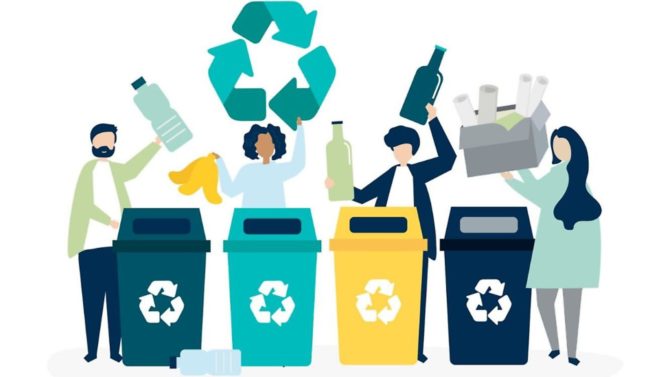How does recycling work in France?

Whether you are shopping for food or household products or trying to dispose of old items, we look at eco-friendly options in France

Household Recycling
In France, household waste and rubbish collection is managed by the local authorities. They establish and facilitate a local waste charter, including recycling proposals. In general, most French households are expected to separate compost-type waste (e.g. food and garden waste) from paper, plastic and glass waste that can be recycled. Separate bins are provided for different types of waste – either for every home in larger areas where bins are collected weekly from individual houses, or bigger collective bins situated in key cluster areas in villages and rural areas, and for apartment blocks. Increasingly, many local authorities are also implementing ways to reuse compost waste.
Other rubbish or unwanted household items – such as textiles, furniture and electrical products – should be taken by the household responsible direct to the local tip (déchètterie), where there are also different skips for different types of products. There are more than 4,500 tips across France, most of which have links with local recycling organisations (see ressourceries below) that work to repair, reuse or find new homes for unwanted or slightly damaged objects.
Eco-eating
France was arguably later than some of its European friends to develop the organic food market (or bio food as it is labelled in France) but today there are numerous organic food shops as well as dedicated organic food aisles in French supermarkets.
On the other hand, France is undoubtedly ahead of many countries when it comes to food air miles. Nearly every village still has a local butcher (who sources meat and poultry locally, and often makes their own pâtés and saucisson), one if not two local boulangeries baking fresh bread every day, and of course the weekly market where stallholders sell fresh local produce and cheese. Not forgetting either that most of the wine sold across the country comes from French vineyards.
Plus the French are careful to prevent food waste. In 2016, France became the first country to ban its supermarkets from throwing away or destroying good quality unsold food. Excess food that is in or just past its sell-by date must be donated to charities, food banks or for use as animal feed.
__________________________________________________________________________________________________
Don’t Miss

______________________________________________________________________________________________________________
Second-Hand
A growing phenomenon in France is a type of second-hand recycling ‘shop’, known as a ressourcerie. These organisations collect unwanted objects that are in reasonably good repair, either brought direct by previous owners or passed on by the local tip. They either resell these items at very low prices as they are, or carry out repairs or ‘reinvent’ their use for sale at a more marketable price. For example, recycled coffee packets might be made into carry bags. They also provide employment, usually working with the job centre (Pôle emploi) to help disadvantaged people into the workplace, and often run recycling workshops.
Government Plans
A ban on destroying unsold clothes, electronics and cosmetics is being considered in France. Prime Minister Édouard Philippe has announced that the government plans to fight against waste in favour of a ‘circular economy’ with a new bill intended to come into force within the next four years. This bill will include measures to prohibit shops disposing of unsold products and to instead put in place ‘systematic recycling’. Currently, around €650 million (£576m) worth of unsold non-food items are thrown away or destroyed every year in France. Special arrangements are anticipated for the luxury sector. The Prime Minister reiterated his commitment to sustainability in a speech at the National Assembly: “I believe possible a new economic model that produces wealth, and therefore employment, without spoiling, contaminating or destroying.” He added: “We must invent an economic model where energy sobriety, clean transportation, healthy eating, and recycling are growing much faster than the rate of growth.”
____________________________________________________________________________________________________________________
Read Next
Share to: Facebook Twitter LinkedIn Email






